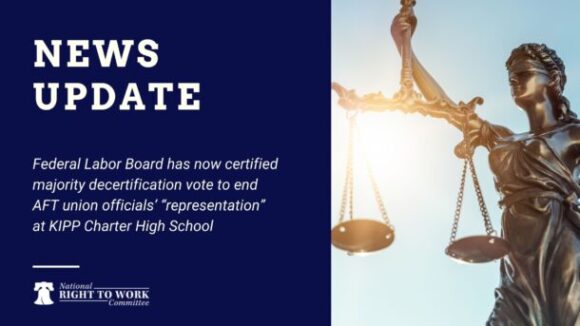Will Team Biden Weaponize Workers’ Pensions?
Big Labor abuse of worker pension and benefit funds as a means of advancing union bosses’ self-aggrandizing policy objectives is a familiar phenomenon.
On Monday, as its 2013-2014 term drew to a close, the U.S. Supreme Court issued its ruling in Harris v. Quinn. National Right to Work Legal Defense Foundation attorneys and the eight plaintiffs they represented in this case won a significant, but incremental victory against compulsory unionism.
A 5-4 High Court majority led by Justice Samuel Alito found that these and other Illinois home health caregivers could not be forced, either by gubernatorial executive order or by statute, to pay dues to an unwanted union in order to be reimbursed for their efforts with funds indirectly furnished by a Medicaid waiver program.
Alito, along with Chief Justice John Roberts and Justices Antonin Scalia, Clarence Thomas, and Anthony Kennedy, found that the caregivers could not be constitutionally forced to bankroll a union under Abood v. Detroit Board of Education, the 1977 Supreme Court precedent that first sanctioned compulsory-dues schemes in the public sector, even as it conceded that such schemes “interfere” with the First Amendment rights of dissenting employees.
The Harris majority reasoned that the home caregivers, in part because they are hired, fired and supervised by their patients, not the state or any of its jurisdictions, are not “full-fledged” public employees. Instead, they are at most “partial” public employees, to whom the rationalizations furnished by the Abood majority for coerced support for unions do not apply.
Since they found Abood not to be applicable in the case at hand, Alito et al opted not to revisit that decision. However, Alito’s opinion strongly suggested that Abood was wrongly decided, calling its “analysis questionable on several grounds.”
Even more than the finding that home health caregivers are not covered by Abood, the harsh critique of that decision in the majority opinion appears to have disturbed deeply Justice Elena Kagan and the three other dissenters.
In her 25-page opinion berating the majority for limiting the scope of Abood and hinting it could be revisited soon, Kagan insisted that Abood was so deeply “embedded” in labor policy that no one on the High Court ought even to consider whether it was factually well grounded. But in order to argue thus she had to ignore several important facts herself.
For example, to justify Abood, Kagan’s dissent (see the last 25 pages of the link below) pretends that all public employees, including union nonmembers, who are subject to union monopoly bargaining benefit thereby. It is possible that Justice Potter Stewart, who wrote the Abood opinion 37 years ago, and the other justices who joined with him actually believed this, but there is no plausible way Kagan does.
At the Harris oral arguments in January, Kagan and the other dissenters were of course present while Alito repeatedly grilled Service Employees International Union (SEIU) lawyer Paul Smith about whether it is permissible, under the First Amendment, for the government to force public employees to bankroll a private organization, i.e. a union, that they reasonably believe is harming them.
At one point, Alito cited the example, well-grounded in reality, of teacher union officials who oppose merit pay and any change in the tenure system, and a teacher who is not a union member and “disagrees completely with the union on these issues.”
Even though the teacher is not a union member, continued Alito, he “still has to pay a pretty hefty agency fee, maybe $700 a year. So the teacher is paying this money to the union to make an argument to the employer with which teacher completely disagrees.” Alito subsequently asked Smith what he would say to such an employee.
The SEIU lawyer didn’t make any pretense that teachers and other types of public employees who oppose union officials’workplace agenda somehow “benefit,” on the whole, from having those union bosses act as their monopoly-bargaining agents, and should therefore be forced to pay dues, or be fired. Instead, Smith effectively acknowledged that union officials claim it is their constitutional prerogative to force employees who are harmed, as well as those who are helped, by union monopoly bargaining to fork over union dues as a job condition.
If Kagan really believes that it’s okay under the First Amendment for the government to force civil servants to pay dues or fees for harmful union “representation,” then she should have admitted as much in her minority opinion. As it stands, her dissent amounts to an evasion of the facts.
[PDF]

Big Labor abuse of worker pension and benefit funds as a means of advancing union bosses’ self-aggrandizing policy objectives is a familiar phenomenon.

What impact does handing a union monopoly power to deal with your employer on matters concerning your pay, benefits, and work rules have on your pay?

Federal Labor Board has now certified majority decertification vote to end AFT union officials’ “representation” at KIPP Charter High School